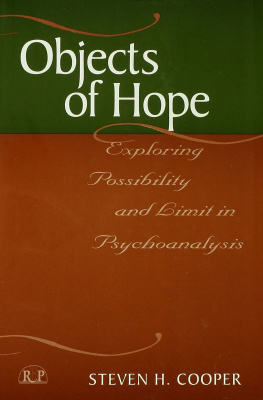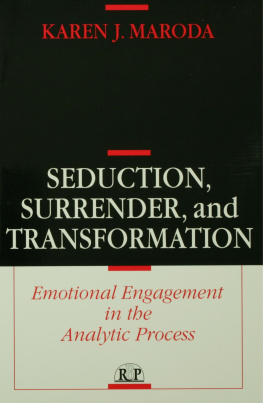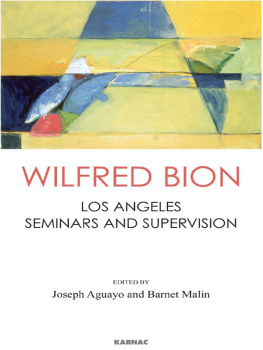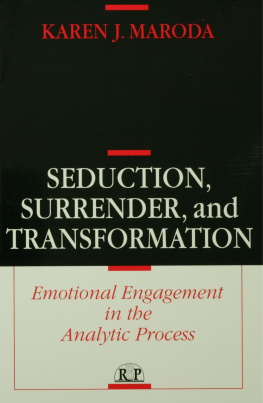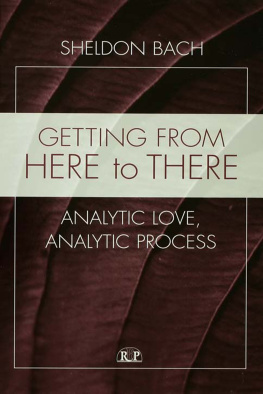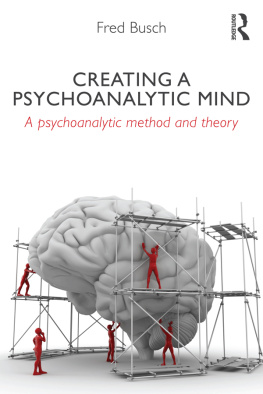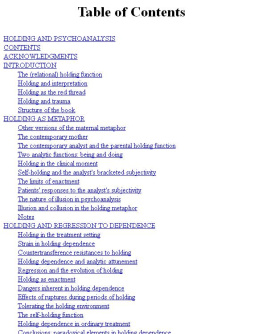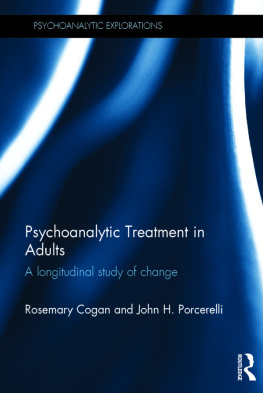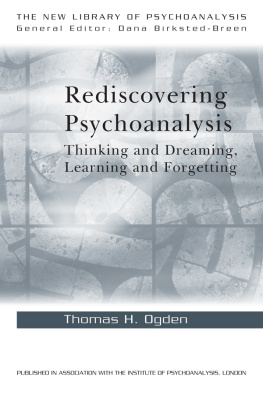The Analysts Experience of the Depressive Position
The melancholic errand of psychoanalysis
Steven H. Cooper

First published 2016
by Routledge
2 Park Square, Milton Park, Abingdon, Oxon OX14 4RN
and by Routledge
711 Third Avenue, New York, NY 10017
Routledge is an imprint of the Taylor & Francis Group, an informa business
2016 Steven H. Cooper
The right of Steven H. Cooper to be identified as author of this work has been asserted by him in accordance with sections 77 and 78 of the Copyright, Designs and Patents Act 1988.
All rights reserved. No part of this book may be reprinted or reproduced or utilised in any form or by any electronic, mechanical, or other means, now known or hereafter invented, including photocopying and recording, or in any information storage or retrieval system, without permission in writing from the publishers.
Trademark notice: Product or corporate names may be trademarks or registered trademarks, and are used only for identification and explanation without intent to infringe.
British Library Cataloguing in Publication Data
A catalogue record for this book is available from the British Library
Library of Congress Cataloging in Publication Data
Names: Cooper, Steven H., 1951- , author.
Title: The analysts experience of the depressive position : the melancholic errand of psychoanalysis / Steven H. Cooper.
Description: London ; New York : Routledge, 2016. | Includes bibliographical references and index.
Identifiers: LCCN 2015032541| ISBN 9781138844100 (hardback) | ISBN 9781138844131 (pbk.) | ISBN 9781315730615 (ebook)
Subjects: | MESH: Countertransference (Psychology) | Depression--psychology. | Professional-Patient Relations. | Psychoanalytic Therapy. | Unconscious (Psychology)
Classification: LCC RC537 | NLM WM 62 | DDC 616.85/270651--dc23
LC record available at http://lccn.loc.gov/2015032541
ISBN: 978-1-138-84410-0 (hbk)
ISBN: 978-1-138-84413-1 (pbk)
ISBN: 978-1-315-73061-5 (ebk)
Psychoanalysis is always an incomplete process. What we help patients to understand is held in the melancholic embrace of incompleteness and limitation. I begin with the notion that part of the art of psychoanalysis involves working in the shadow of incompleteness and this is where we find something useful and often gratifying to offer our patients. Psychoanalysis embodies and enacts incompleteness because a patient who has experienced a good enough analysis understands that the process is limited by the analysts and patients ability to understand the patients mind. Put another way, psychoanalyses are conducted by human beings.
I recently read some words from Michael Parsons about his own experience of doing analysis at a point in his career when he is appreciating that it will not go on forever. It moved me and when I read it, I realized that in writing this book I am trying to come to terms with some of the feelings and ideas that he alludes to here:
I have been sitting behind the couch for 25 years, so I am fairly well along in my working life as an analyst. This patient gives me a sense of how much that is fascinating there is yet for me to discover about psychoanalysis, and how far my analytic capacities have still to develop. I find myself thinking, If I had another 25 years, where might I get to then, in understanding all this?! But I am not going to have another 25 years. So this analysis faces me with recognizing how much I shall never understand about psychoanalysis. It is not required counter-transferentially, to keep this particular analysis on track, that I should contemplate my inescapable losses, failures and, finally, my death. Accepting these and finding a capacity to face them is a necessary psychic function for all human beings. But Mr. Ws analysis does make me more conscious of the need to discover this capacity in myself.
To be sure, for some patients the ways in which incompleteness or limitation is a part of analysis overlaps with earlier experiences of parental or self-limitation. Some patients rail against limitation because it echoes earlier deprivation or disappointment. Some patients seek analysis not to work through limitation but to redress it and end up being disappointed that the opportunity for working through, while extraordinary, is far different from what theyd wished for.
There is sometimes, I would say often, an enormous warmth and intimacy generated through the patients and analysts efforts at understanding the patients inner world just as there is also solitude for each. The notion that patient and analyst will try to see if the unbearable might be bearable is often comforting. It may also provoke feelings of sexual excitement, or the potential despair or abandonment stimulated by the patient fearing that somehow bearing pain might mean that the pain will be minimized in the mind of the analyst. As patients enter more and more deeply into analysis, they become more interested and aware of their analysts mind and often particularly the analysts resistance to bearing the patients psychic pain. They probe our capacities and willingness to take on, contain and understand what they have internalized and in one way or other they are also probing our resistances to doing so.
It is interesting that one of the best reasons for having an analysis as an analyst not only involves working through conflicts, but also in experiencing not working through conflicts. In other words, good analysis allows us to hold unsettling narratives. Life will always be intermittently out of joint, even for the most psychologically privileged among us. Analysts need to learn how to hold their patients and their own sense of limit, grief, incompleteness and disappointment in analytic work. As an analyst, while I believe consciously that everything that I offer is incomplete, a great deal of my internal work occurs in the countertransference struggle with disappointment, incompleteness, and particularly in bearing repetition. And while many analysts such as Rosenfeld (1987) and Schafer (2003) have emphasized the analysts capacity to bear repetition without blaming ones self as analyst or her patient, this is easier said than done.
The analysts sense of disappointment and limitation often reflects realistic assessments of dyadic and existential limitation for integration at any juncture of analytic work. An important function of psychoanalysis relates to how it provides the patient a playground for the transformation of desire, anxiety, sadness and anger into a kind of good enough disappointment and incompleteness. Sometimes, the analysts experiences of disappointment relate to his accurate read on these existential limitations; sometimes, his or her difficulty bearing disappointment relates to unconsciously grandiose or inhibited expectations. Both unconsciously grandiose and inhibited expectations may serve to titrate his or her anxiety about both incompleteness and the risks of knowing about and analyzing transference. At still other times, his capacity to bear disappointment relates to a repository of regret or sadness about either his own limitations as an analyst and in his own analysis, or as an analyst in his work with patients.
It is a curious matter that we have long been focused on the importance for our patients of developing their capacity to mourn and to accept conflict and incompleteness in the analytic processhallmarks of the depressive positionyet we have had relatively less to say explicitly in ongoing analyses (apart from termination) about the analysts experience of these capacities in the analytic situation. How we experience and work with our own sense of incompleteness, our own grief, during the analytic process is deeply influential in helping our patients.
Next page

